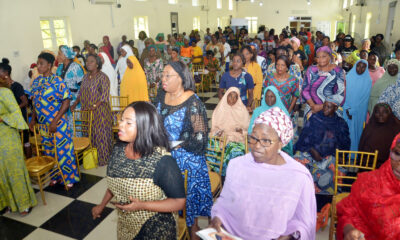Exactly seven days to the January 31 deadline for the return of old notes to banks across Nigeria, Nigerians have continued to express worry over the shortage of the redesigned N1,000, N500 and N200 naira notes.
Most banks have been issuing old notes despite threat of sanctions by the Central Bank of Nigeria (CBN).
While Nigerians rush to meet up the deadline by thronging banks to deposit the old notes, they have been complained bitterly as banks keep giving them old notes whenever they withdraw either from the counter or at the Automated Teller Machines (ATMs) points.
In Birnin Kebbi, the capital city of Kebbi, customers reportedly stormed banks to either deposit or receive money, saying they have limited access to the new naira notes.
In their large number, customers at various banks, were sighted making efforts to make transactions.
In Osun State, some traders have started rejecting the old notes and opting for cashless means of payment.
When Investors King visited some markets in Ilesa and Osogbo, buyers complained that some traders no longer collect the old notes and explained that the traders feared not to be caught up in the web of the deadline.
Some traders were even said to hike the price of their goods in the situation where the buyer is paying with the old notes while others would easily accept mobile bank transfer.
“I visited Atakunmosa Market in Ilesa on Monday and I was shocked when the woman selling rice rejected the N1,500 old notes I gave to her. She said I should pay with the new notes. We had to argue before I left her because everyone knows that the new notes is scarce and banks are not helping matter. If you go back to return this old money, one will still withdraw the old money. so, I wonder why traders are now rejecting the old notes when it’s not as if the deadline is here,” a resident of Ilesa who identified himself as Dare Atoyebi said.
Also lamenting the development at a commercial bank in Birnin Kebbi, Malam Musa Gero from Kukaru, Gulma in Argungu Local Government Area of Kebbi State said there was a long queue at the bank because people are rushing to return the old notes.
Gero said most of the people that had been paid were paid with the old notes, adding that hundreds of residents who besieged the bank overwhelmed the officials.
While appealing to the Federal Government and the Central Bank of Nigeria to consider the plights of Nigerians and extend the time to a certain period to accommodate all, Gero said if there is no extension, many people would be counting loses even before the deadline.
He said with the rush, most customers would not be able to deposit the old cash while those who were able to do so would still be given the old notes.
In his remarks during an interview at another commercial bank visited, Malam Muktar Sambo from Zogirma Village, Bunza Local Government Area, lamented that in the whole of Zogorma, they didn’t have a single bank to do any transaction, adding that many residents had to travel far distance to deposit their money.
He also begged the CBN for extension of the expiration date saying that most inhabitants of rural communities were yet to understand the new policy nor find it easy to take their money to the banks.
Another customer, Ibrahim Hassan, from Birnin Kebbi Local Government Area of the state, also noted that many people may not be able to deposit their old notes before the deadline.
He complained of long queues at the bank and also lamented the non-availability of the new naira notes in circulation in the state.


 Forex2 weeks ago
Forex2 weeks ago


 Naira2 weeks ago
Naira2 weeks ago
 Billionaire Watch2 weeks ago
Billionaire Watch2 weeks ago




 Naira2 weeks ago
Naira2 weeks ago




 Naira2 weeks ago
Naira2 weeks ago




 Naira4 weeks ago
Naira4 weeks ago


 Naira6 days ago
Naira6 days ago
 Banking Sector4 weeks ago
Banking Sector4 weeks ago





















